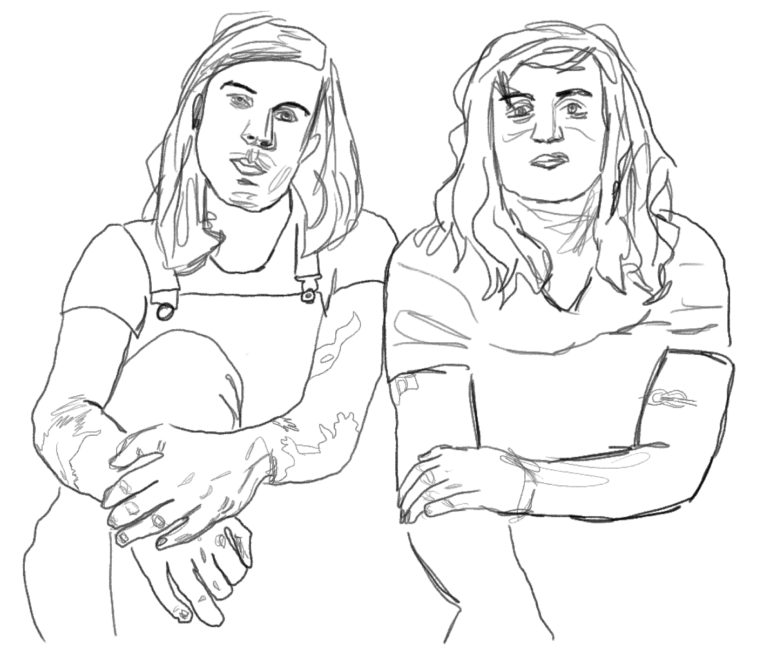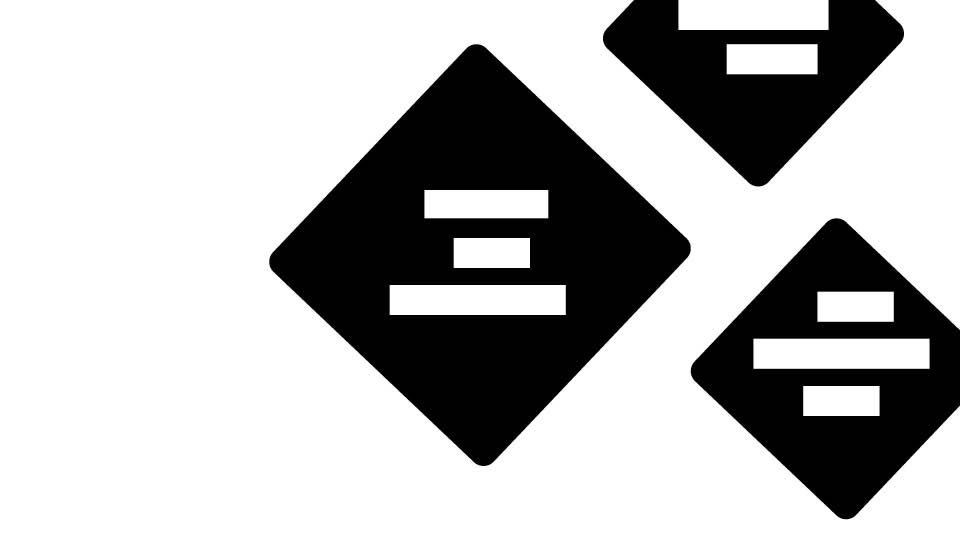On February 12, 2023, Hamden’s Space Ballroom was a veritable convention of musical subgenres. Millennial hardcore fans in gray hoodies with the hoods up, older bearded metalheads wearing band T-shirts, and young queer punks with piercings and tattoos milled about the small, dim venue. The crowd’s energy felt more like a school dance than a punk show, and even though small mosh pits formed for hard-hitting local hardcore bands Intercourse and Kidnapped, they fizzled out quickly once it became clear that most fans preferred watching to dancing. As a casual fan of hardcore who had always enjoyed the collective catharsis of a good mosh-pit, I came toward the front of the audience and hoped for some mayhem as the headliner, Space Camp, ascended to the stage.
I got mayhem, alright. June Aino and Daisy Josefa, the two vocalists and core members of Space Camp, led a plethora of supporting musicians up to the platform, packing the small stage with an upright bass, a cello, a sousaphone, a trombone, a synth and a drum set, with a second drummer set up in the middle of the audience. The musicians smiled broadly as they sound checked, their classical instruments contrasting starkly with their tattooed arms and all-black outfits. But nothing could have prepared me for the overwhelming cacophony of orchestral punk that followed. Somehow, with no guitar or bass, Space Camp’s music was more forceful than any punk band I’d heard.
With the drummer in the middle of the crowd, there wasn’t any room to start a mosh pit. But there was no need for one; the crowd’s attention was fixated on the hardcore symphony before us. The chaos I’d expected in the audience was happening on stage instead: June and Daisy screamed powerfully, the brass instruments boomed, and the second drummer wielded a drill during one song and a bugle horn during another. One local reviewer noted in their article about the concert that the sheer force of Space Camp’s sound shattered a lightbulb in the bathroom, but no one around me blinked an eye. As one of the attendees, Connecticut resident Myles Vincent, phrased it afterwards, “it’s just an explosion. Rather than going to see a band go to play their songs, it’s like you’re going to see something go down.”
—
Brass instruments and power tools are rare at most live shows, but particularly in hardcore, an aggressive offshoot of punk music with a relatively strict sound and ethos. While the genre varies between bands and over time, there is nonetheless a defined set of expectations for hardcore songs: fast and brutal riffs, deeply screamed vocals, and climactic song sections called “breakdowns” intended to make listeners go wild in the mosh pit. Historically, hardcore’s aggressive attitude, as well as its lyrical preference for themes like hometown pride and the straight-edge lifestyle over the progressive politics of anarchist bands, attracted mostly male musicians and listeners to hardcore shows. Space Camp’s novel sound, which their bio calls “non-denominational, non-binary hardcore,” is unique in a genre as stylistically codified as hardcore. Consequently, whenever they’re booked on a show with a bunch of hardcore bands, “it’s a mixed bill, because we have single handedly mixed the bill,” says Daisy.
Yet this very love for instrumental play created Space Camp in the first place. June and Daisy became friends in fourth grade after finding themselves to be among the few fourth graders registered to learn trombone at their South Windsor Elementary School. “Our houses were so close together that we could walk through a neighborhood and some woods and be at each other’s houses,” says June when I speak with the band a few days after the show. Daisy started playing guitar and drums, while June kept learning trombone and picked up keys, and they briefly experimented with surf rock in high school before officially forming Space Camp in March 2013. Their playful debut record consists of Daisy playing drums, June playing synth, and a friend reading passages aloud from books they found in their practice space. “At the time we were like, this is a cool concept,” says Daisy. “It’s since been wiped from the internet.”
In 2014, the band added a bassist, June introduced a full piano in addition to their MicroKORG synth, and Space Camp began booking more shows and seriously recording music. Their stylistic influences at the time were hardcore bands like Ceremony, Punch, and Code Orange Kids, whose influence is still evident in Space Camp’s roughly screamed vocals, ominously dissonant chords, and punchy song sections. “We’ve always been suckers for a lip-curling hardcore breakdown,” Daisy tells me. Yet instrumental diversity remained integral to their ethos; listening through their Bandcamp releases, you’ll hear just about everything—tuba, guitar, contrabass, oboe—all absorbed into their heavy punk sound. Their latest album Gold Star was released in January of this year and continues this tradition with twenty-nine minutes of magnificent auditory havoc.
Space Camp’s take on hardcore has thrived in Connecticut largely because of the state’s unique music scene. Whereas more densely populated states tend to stratify into separate subgenres with minimal overlap, Connecticut’s small size leads to a melding of styles perfect for Space Camp’ eclectic blend of genres. As Daisy says, there’s a distinct charm to a place where only one show is happening on a given night: “If it’s a Friday night in Philadelphia in July, there’s six shows going on. You can get the best line-up at a sick venue, and everyone you know will still text you and say, sorry, we’re going to another show. But if we’re playing in Connecticut, everyone who’s interested is there, it is the thing to do.”
Space Camp is only one example of Connecticut bands’ propensity for music experimentation. Tarek, the lead singer of Intercourse, says there’s an entire scene of local experimental punk—“I call it outsider hardcore”—dedicated to fostering a left-leaning, welcoming milieu opposed to the exclusivity of more regimented music scenes. “We’re not into that macho, gatekeepy shit,” he says proudly. Intercourse, which has been playing since 2014 and is soon releasing their new album Halo Castration Institute, is itself a genre-bending project too, with “one foot in hardcore and one foot in noise rock.”
The Connecticut scene’s inclusivity doesn’t just apply to the music, but also to the community itself. While hardcore is often perceived as a hypermasculine boy’s club, Connecticut’s outsider hardcore shows are “a place for a lot of people where they can go and be themselves,” says Tarek. “If you want to wear make-up and goth out, no one’s gonna bat an eye.” Tarek, whose family is Egyptian, grew up as one of the only people of color in the small town of Naugatuck, Connecticut. His upbringing was full of alienating and aggressive encounters with white schoolmates. Connecticut’s music scene was also exclusionary, though in different ways. “People at shows used to tell me, don’t wear a Marilyn Manson shirt or you’ll get the shit beat out of you, make sure to wear a Cannibal Corpse shirt or something neutral,” Tarek remembers, laughing. Yet the young, left-leaning audience of Connecticut’s current outsider hardcore scene makes no space for such hostility, from musical elitism to racism and misogyny. “There’s lots of trans people, there’s lots of queer people, there’s lots of people of color. This is a really inclusive scene for everybody, and we’re really proud of that. We’ve had people come through and say, wow, this little niche of Connecticut is really special.”
This warm and welcoming attitude suffused the venue after Space Camp’s set concluded. Young newcomers to the scene and longtime outsider hardcore fans alike chatted eagerly with me about what we’d just experienced together and about other shows they’d recently attended. If the disparate contingents had struggled to gel at the start of the night, the singular intensity of Space Camp’s eclectic sound seemed to have bonded everyone at the Space Ballroom, dissolving any residual awkwardness in the space.
I shook hands with Daisy and Tarek, who both warmly thanked me for coming and told me they’d be glad to interview. In the merch line, one fan told me he’d grown up in Connecticut, moved to Austin for nearly a decade, and only just returned. The scene in his time had been aggressive and intimidating, he told me, and the warmth of Space Ballroom’s crowd shocked him. Though this was his first time seeing Space Camp, his beaming smile while talking about his experience at the concert suggested he was bound to become an outsider hardcore regular.
I left with a newly purchased Space Camp T-shirt tucked under my arm. Every time I’ve worn it since, at least one person has stopped me to ask if I caught them at Space Ballroom. Daisy was right about the perks of a small music scene; these people really had all been to the same show as me. The next time I find myself toppled over in a Connecticut hardcore mosh pit, I’m certain one of these familiar faces will be around to lift me up.
—Danya Blokh is a junior in Timothy Dwight College.



